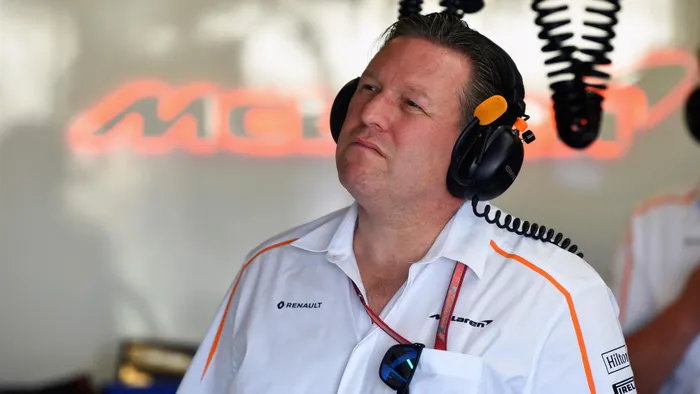
Zak Brown McLaren Executive Director. File Picture
Image: File picture
McLaren Racing chief executive Zak Brown has found himself at the centre of a courtroom storm after being accused of instructing staff to delete messages relating to Alex Palou’s aborted move to the team.
Brown, testifying in London’s Commercial Court this week, strongly denied allegations of destroying evidence, insisting that the use of WhatsApp’s disappearing messages feature was “company policy” and not a deliberate attempt to withhold information.
The accusations surfaced when Palou’s legal team produced messages suggesting McLaren employees had been told to use disappearing chats to “cover their ass on lawsuits.”
One alleged exchange even showed Brown himself instructing team members to “keep everything on WhatsApp and then delete.”
For Palou’s lawyers, this behavior represented a breach of the duty to preserve evidence once litigation became likely. Brown countered by saying the setting is used routinely across McLaren operations and that no relevant documents were intentionally destroyed.
The row over messaging has become a headline-grabbing subplot in a legal dispute that stretches back more than two years. At its heart, the case is about promises made and broken between one of IndyCar’s brightest talents and one of motorsport’s most famous teams.
In 2022, Alex Palou was locked in a messy tug-of-war between his then-employer Chip Ganassi Racing (CGR) and McLaren.
Ganassi announced it had exercised an option to keep Palou for the 2023 season, but the Spaniard publicly refuted that statement, declaring his intent to join McLaren. For weeks, lawyers sparred over contracts until a mediated settlement saw Palou stay with Ganassi for 2023 while simultaneously conducting Formula 1 testing and reserve duties with McLaren.
The expectation was that Palou would switch full-time to McLaren’s IndyCar program in 2024. But in August 2023, he stunned the paddock by informing Zak Brown he no longer intended to honor that agreement.
Instead, Palou recommitted to Ganassi, citing doubts about McLaren’s ability to deliver him on track success and lingering frustrations about the lack of a clear pathway into F1.
McLaren responded by filing a lawsuit in London, seeking damages of around $20.7 million (approximately £15.4m). The team argues Palou’s U-turn inflicted significant financial and reputational harm.
According to their filings, losses included a signing bonus already paid to Palou, anticipated sponsorship and marketing deals tied to his arrival, expenditure on preparations for his role.
Lost opportunities in both sporting and branding terms. For Brown, the principle is as important as the money. McLaren insists Palou broke a binding contract, and that such conduct cannot be brushed aside in the highly competitive world of motorsport.
Palou does not deny walking away from the deal, but his defense is that McLaren overstates its losses and misled him about his prospects.
Central to his case is the claim that McLaren enticed him with the prospect of an F1 future. When the team signed Oscar Piastri in 2022, Palou’s hopes of progressing beyond IndyCar appeared to evaporate.
He later testified that he felt “upset, worried and angry” about Piastri’s arrival, and questioned whether McLaren ever truly intended to give him an F1 seat.
His lawyers argue that McLaren’s $20 million damages claim is exaggerated, speculative, and impossible to quantify. They also point to the controversy around missing WhatsApp messages as evidence the team may have engaged in dubious conduct to cover its tracks.
The messaging issue has added an extra layer of intrigue. Palou’s team allege that McLaren, under Brown’s direction, failed to preserve crucial communications, despite being under instruction to do so.
Brown, however, has pushed back hard, saying disappearing messages are a common practice at McLaren and that compliance with legal obligations was never compromised.
Still, the optics are uncomfortable. Judges frown heavily on any suggestion of spoliation of evidence, and the notion of deleting sensitive chats at the very moment a multimillion-dollar lawsuit loomed could weigh against McLaren if the court believes intent was involved.
As of October 2025, the case continues in London’s Commercial Court. Both Brown and Palou have given testimony, with cross-examinations probing what was promised, what was expected, and what was lost when Palou walked away.
The judge must now determine whether McLaren is entitled to damages, and if so, how much. A decision is expected later this year, with the ruling potentially setting a precedent for how cross-disciplinary motorsport contracts are enforced.
For Brown, the battle is as much about defending McLaren’s reputation as about recouping millions. For Palou, it is about proving he was misled and avoiding a financial penalty that could haunt his career.
Whatever the outcome, the case has already exposed the messy underside of modern driver contracts—and shown that in the high-stakes world of racing, even disappearing messages can leave a lasting trace.